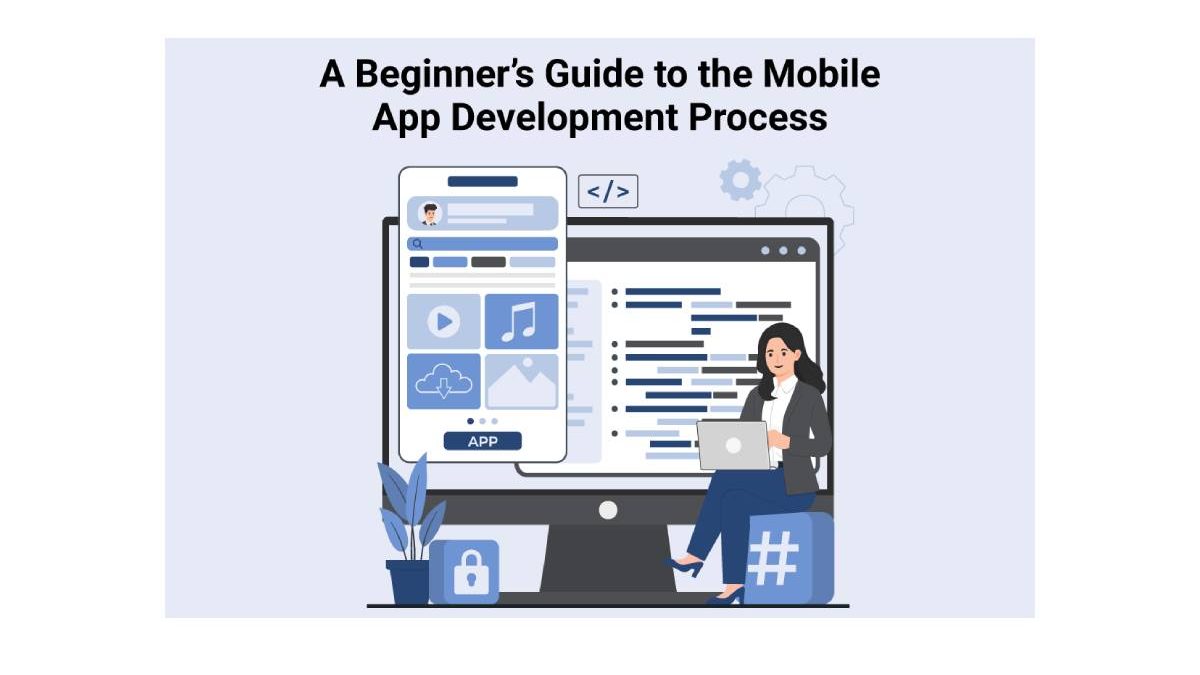A Beginner’s Guide to the Mobile App Development Process
Investing in mobile app development is worth it, no matter whether you’re a startup or an established organization. The global mobile app market size was valued at $330.61 billion in 2024 and is projected to reach around $1103.48 billion by 2034, with a CAGR of 14.33%.
So, if you’re a startup owner planning to build an app for your business, here’s a beginner’s guide to the mobile app development process.
Let’s first start with a brief overview:
Table of Contents
What is Mobile App Development?
Mobile app development is the process of building applications for different operating systems, such as Android or iOS. From games and productivity tools to social networking and eCommerce apps, mobile app development services cover a wide range of software applications.
The mobile app development lifecycle involves various steps, such as ideal conceptualization, market research, design, development, testing, and deployment. It helps in delivering functional and user-friendly applications for mobile devices.
How to Develop a Mobile App? Step-By-Step Guide
Let’s explore key steps in mobile app development process:
Idea Conceptualization
Before starting your mobile app development process, you must have clarity regarding your business’s objectives, ideas, and goals.
- What’s your purpose in building your app?
- What problems are you trying to resolve with your mobile application?
Your objectives will ultimately determine your entire app development process. It’s essential to set goals as per your end-users as well as your business. Make sure every goal has clear KPIs to determine and track its success.
For instance, let’s say you want to build an app for your finance business. Your goal might be to increase the number of users signing up for investment plans through mobile devices.
To ensure you achieve this goal, you must first analyze your current conversion rates on mobile platforms to establish a benchmark. This data will allow you to compare the performance and measure the success of your app once it is launched.
Research Market
When creating a mobile app for business, it’s essential to conduct research and identify your target market and audience. This research will help you understand how consumers interact with brands or market dynamics. You can also check users’ feedback for top mobile applications. It will help you launch a better product in this competitive market.
You also need to analyze your target audience’s location, average age, and different types of devices they use.
Design Intuitive UI/UX
Another important step of the mobile app development process is crafting an intuitive UI/UX design. Prototyping and design are the foundation of successful app development. UI/UX designers incorporated seamless transitions, animations, and intuitive interfaces into the app’s design.
In this guide to app design, they balance the conceptual and tangible, delivering aesthetically pleasing designs for mobile apps.
Hire an App Development Company
One of the most important steps in mobile app development is hiring a reliable company. With a reliable mobile app development company, you won’t have to worry about the latest functionalities and features in your app. Their dedicated team includes UI/UX designers, project managers, developers, and testers.
Additionally, hiring a reputable mobile app development firm can also help you leverage its industry expertise and the latest technologies. It paves the way for a more seamless, innovative, and user-centric app experience.
Test Your App
Proper testing plays a crucial role in reducing development costs and time, identifying bugs, and enhancing your reputation as a service provider. Additionally, implementing strong security measures is essential.
Conducting regular security testing allows you to detect vulnerabilities early, prevent potential data breaches, and safeguard both user data and your business reputation. By ensuring robust security practices and consistently testing them, you can significantly minimize risks and build greater trust in your services.
Launch Your App
Once testing is complete, you can proceed to submit your app to the Apple App Store or Google Play Store. However, it’s important to ensure that your app complies with the developer guidelines set by Apple and Google.
Additionally, your monetization strategy must align with their respective policies to ensure a smooth approval process.
The Final Thought!
Hopefully, you have now got an idea about the mobile app development process. But always remember a minor bug or performance issue and poor design of your app can damage your business reputation in the market. So, it’s recommended to hire a reputable mobile app development company with expertise in delivering custom apps for both Android and iOS platforms.

